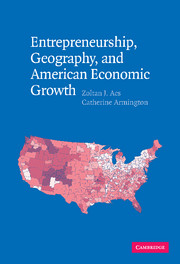Book contents
- Frontmatter
- Contents
- List of Tables and Figures
- Preface
- 1 Introduction
- 2 Entrepreneurship, Geography, and Growth
- 3 Regional Variation in Entrepreneurial Activity
- 4 Human Capital and Entrepreneurship
- 5 Entrepreneurship and Employment Growth
- 6 Summary and Theoretical Insights
- 7 A Formulation of Entrepreneurship Policy
- Appendix A: Firm Formation and Growth Data from the Longitudinal Establishment and Enterprise Microdata (LEEM)
- Appendix B: 1995 + 1996 Firm Formation Rates for U.S. Labor Market Areas with 1994 Labor Force and Establishments
- Appendix C: Service Industry Standard Industrial Classification (4-digit SIC) Codes and Their Subsectors, with 1995 Establishment and Employment and Changes to 1998, and 1996 through 1998 Firm Formations per 100 Establishments in Subsector in 1995
- Appendix D: 1991–1996 Employment Growth Rates and Share of High-Growth Establishments in Labor Market Areas, with 1991 Employment, Establishments, and Population, and 1991–1996 Population Growth and Relative Employment Growth Rates
- References
- Index
7 - A Formulation of Entrepreneurship Policy
Published online by Cambridge University Press: 31 July 2009
- Frontmatter
- Contents
- List of Tables and Figures
- Preface
- 1 Introduction
- 2 Entrepreneurship, Geography, and Growth
- 3 Regional Variation in Entrepreneurial Activity
- 4 Human Capital and Entrepreneurship
- 5 Entrepreneurship and Employment Growth
- 6 Summary and Theoretical Insights
- 7 A Formulation of Entrepreneurship Policy
- Appendix A: Firm Formation and Growth Data from the Longitudinal Establishment and Enterprise Microdata (LEEM)
- Appendix B: 1995 + 1996 Firm Formation Rates for U.S. Labor Market Areas with 1994 Labor Force and Establishments
- Appendix C: Service Industry Standard Industrial Classification (4-digit SIC) Codes and Their Subsectors, with 1995 Establishment and Employment and Changes to 1998, and 1996 through 1998 Firm Formations per 100 Establishments in Subsector in 1995
- Appendix D: 1991–1996 Employment Growth Rates and Share of High-Growth Establishments in Labor Market Areas, with 1991 Employment, Establishments, and Population, and 1991–1996 Population Growth and Relative Employment Growth Rates
- References
- Index
Summary
Introduction
As we saw in Chapter One, the latter Schumpeter (1942) had pessimistic prognoses about the future of capitalism, while the early Schumpeter (1911) did not articulate any social feedback problems. In this volume, we propose an American solution to the social feedback mechanism, one that is consistent with the work of the early Schumpeter. American capitalism differs from all other forms of industrial capitalism in its historical focus on both the creation of wealth (entrepreneurship) and the reconstitution of wealth (philanthropy). Philanthropy is part of the implicit social contract that continually nurtures and revitalizes economic prosperity (Schramm, 2005). Much of the new wealth created historically has been given back to the community to build up the great social institutions that have a positive feedback on future economic growth. This entrepreneurship-philanthropy nexus has not been fully explored by either economists or sociologists. We suggest that American philanthropists – especially those who have made their own fortunes – created foundations that, in turn, contributed to greater and more widespread economic prosperity through knowledge creation (Acs and Phillips, 2002).
In traditional industrial societies, wealth creation, wealth ownership, and wealth distribution were, in great part, left up to the state or to organized religion. However, in an entrepreneurial society, individual initiative plays a vital role in propelling the economy and the society forward.
- Type
- Chapter
- Information
- Entrepreneurship, Geography, and American Economic Growth , pp. 154 - 172Publisher: Cambridge University PressPrint publication year: 2006



